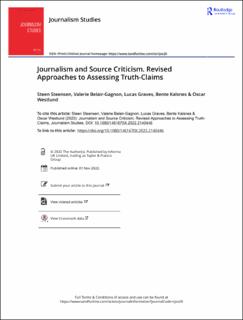Journalism and source criticism: Revised approaches to assessing truth-claims
Peer reviewed, Journal article
Published version
Permanent lenke
https://hdl.handle.net/11250/3031252Utgivelsesdato
2022Metadata
Vis full innførselSamlinger
Originalversjon
https://doi.org/10.1080/1461670X.2022.2140446Sammendrag
This article presents a hermeneutical epistemology for the assessment and production of truth-claims in journalism. This epistemology is based on Gadamer’s functional hermeneutics, and it advances the concept of source criticism as an alternative to other practices and understandings of information verification in journalism. The article argues that source criticism is a better approach to bridge the gap between news and truth in journalism in a time of “information disorder”. Source criticism is a common concept in certain journalistic cultures, for instance in Scandinavia, but it needs revision due to current developments in digital information networks. A modern version of source criticism offers great value to journalism as (1) guidelines for the practical assessments of sources and source material, (2) a professional attitude related to what it takes to produce truth-claims, and (3) a tool to perform audits of journalism. The article ends with highlighting three norms for journalistic practice and audits of journalism. These norms, which contain operationalisation of source criticism as journalistic epistemology and methodology, are: (1) harness truth-claims with modesty; (2) deploy interpretive transparency; and (3) operationalise self-reflective truth-claims. Journalism and Source Criticism. Revised Approaches to Assessing Truth-Claims

